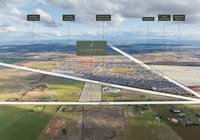
Power crisis is as big as Australia’s housing crisis: Charter Hall
Australia faces an energy shortfall as severe as its housing crisis, and the lack of reliable supply that already affects increasingly sophisticated industrial property assets is a big hurdle for investment ramping up in data centres, says Charter Hall boss David Harrison.
Industrial and logistics assets that had evolved from basic sheds to sophisticated facilities with extensive automation required more power supply than 20 years ago and the challenges of connecting them to the grid would multiply with the growth of data centres, Mr Harrison said.

“In Australia, we’ve got a power crisis as much as we’ve got a housing crisis,” the company’s managing director and group chief executive told The Australian Financial Review Property Summit on Tuesday.
“The whole country’s got delays in procuring power. The grid operators have got capacity constraints. Clearly, it’s just a whole new wave when you start talking about data centres in terms of the need for power.”
Access to power and the management of the country’s energy transition will influence the ability of investors to tap new sources of demand for assets such as data centres, which will soar as the use of artificial intelligence applications increases.
Blackstone Australia head of real estate Chris Tynan, who last week oversaw the world’s biggest data centre deal, the $24 billion acquisition of operator AirTrunk, said what drove the opportunity – which founder Robin Khuda said was on track to become a $100 billion company – was its ability to follow the power.
“Power is absolutely the constraint,” Mr Tynan said.

“For AirTrunk, their relationships with the vertical supply chain and, frankly, their ability to go out and, substation by substation, identify where the power is overbuilt, or where it’s likely to have some capacity, has been an identifying feature and a unique feature of their management capability.”
AirTrunk could opportunistically go where the power was, Mr Tynan said.
“When you have Asia as your playground, not just south-east Melbourne, then you can follow that power around,” he said.
“And certainly, jurisdictions are very different. States in Australia are very different. Countries around Asia are extremely different. So whilst it might be true for the Sydney CBD that power is quite constrained, if you go to the Hunter [region of NSW], it might be different but if you go to Johor, very different again.”
Barrenjoey chief economist Jo Masters said the lack of a reliable energy supply was likely a constraint on Australia’s ability to use AI. Previous productivity-boosting innovations had been held back or advanced in the past by human skill, but access to energy was likely to be the major driver in this case, she said.

“I wonder if energy might actually be the constraint this time,” she said. “Our people will be able to use AI and [Chat] GPT. But to really get that productivity dividend, we need to have enough energy, and we need enough chips, and we need to have enough business investment to completely upgrade your tech and your office space.
“So it is a constraint on productivity, and it’s a constraint on transition as well.”
Mr Harrison said the problems would only compound if they weren’t resolved quickly.
“If governments and the private sector don’t get more solutions, we’re going to have a bigger problem in five years than we’ve got now,” he said.
The lack of power would trigger a level of competition between competing needs, he said.
“It’s going to be quite an interesting regulatory environment – how the rare availability of power is then distributed in the community,” Mr Harrison said. “That’s something that’s going to be really interesting – to see to how it plays out.”











